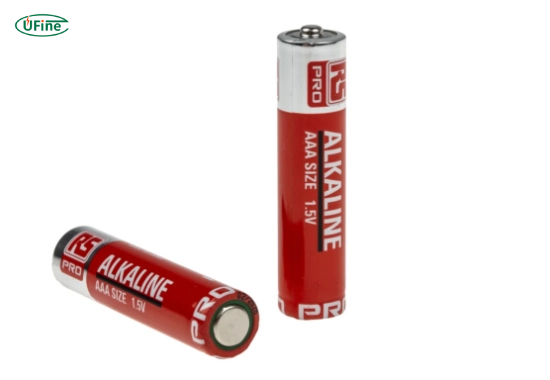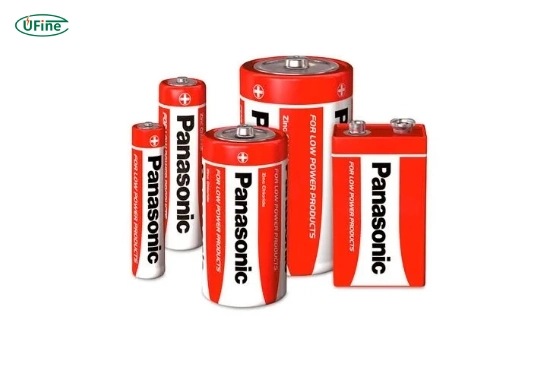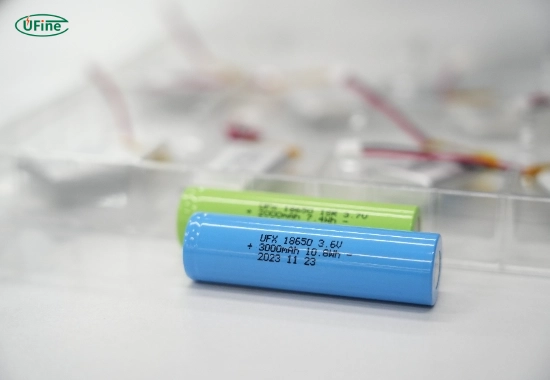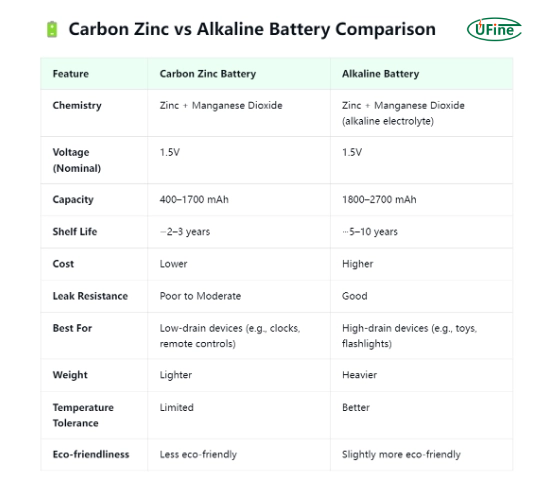
- Part 1. What are alkaline batteries?
- Part 2. What are carbon-zinc batteries?
- Part 3. What are lithium batteries?
- Part 4. Carbon zinc battery vs alkaline: Key differences
- Part 5. Comparing performance: alkaline vs. carbon-zinc vs. lithium
- Part 6. Ideal applications for each battery type
- Part 7. Environmental impact of each battery type
- Part 8. Cost comparison: which battery is more affordable?
- Part 9. Safety considerations for each battery type
- Part 10. Choosing the right battery for your needs
- Part 11. FAQs about carbon zinc battery vs alkaline vs lithium
Choosing between a carbon zinc battery vs alkaline or lithium can significantly impact your device’s performance. Whether you need long-lasting power for a remote control or high voltage for a digital camera, understanding the differences between carbon-zinc, alkaline, and lithium batteries is crucial. This 2024 guide compares cost, shelf life, and ideal uses, answering key questions like “Are carbon zinc batteries better than alkaline?” and “When to choose lithium?”.
Part 1. What are alkaline batteries?
Alkaline batteries are one of the most widely used types of batteries in household devices. They operate through a chemical reaction between zinc and manganese dioxide, utilizing an alkaline electrolyte, typically potassium hydroxide, to produce electrical energy.
Key Features:
- Voltage: Alkaline batteries typically provide 1.5 volts per cell, making them suitable for various devices.
- Shelf Life: When stored properly, these batteries can last up to 10 years, making them a reliable choice for long-term use.
- Capacity: Alkaline batteries generally offer a higher capacity than carbon-zinc batteries, ranging from 1,000 to 2,800 mAh, depending on the size and brand.
Advantages of Alkaline Batteries:
- Longer Lasting: In high-drain devices like digital cameras or game controllers, alkaline batteries outlast carbon-zinc batteries significantly.
- Widely Available: Alkaline batteries are available in most retail outlets and online platforms.
- Versatile Use: They are suitable for various applications, including toys, flashlights, and portable electronics.
Part 2. What are carbon-zinc batteries?
Carbon-zinc batteries are one of the oldest battery technologies still in use today. They consist of a zinc anode and a carbon rod as the cathode, with an acidic electrolyte that facilitates the chemical reaction necessary for power generation.
Key Features:
- Voltage: Like alkaline batteries, carbon-zinc batteries also provide 1.5 volts per cell.
- Shelf Life: These batteries have a shorter shelf life than alkaline batteries, typically lasting around 3 to 5 years under optimal storage conditions.
- Capacity: Carbon-zinc batteries usually have lower capacities than their alkaline counterparts, averaging between 400 and 1,000 mAh.
Advantages of Carbon-Zinc Batteries:
- Cost-Effective: They are generally cheaper than alkaline and lithium options, making them appealing to budget-conscious consumers.
- Lightweight Design: Their lightweight nature makes them easy to handle and transport.
- Ideal for Low-Drain Devices: Carbon-zinc batteries perform well in low-drain applications such as clocks and remote controls where high power is unnecessary.
Part 3. What are lithium batteries?
Lithium batteries are known for their high energy density and long shelf life. They utilize lithium as an anode material and can be found in both primary (non-rechargeable) and secondary (rechargeable) forms.
Key Features:
- Voltage: Lithium batteries typically provide a higher voltage of around 3 volts per cell, which allows them to power more demanding devices efficiently.
- Shelf Life: When stored properly, these batteries can last up to 10 years or more, making them an excellent choice for emergency devices or infrequent gadgets.
- Capacity: Lithium batteries boast the highest capacity among the three types discussed here, often exceeding 2,500 mAh in standard sizes like CR2032 or AA variants.
Advantages of Lithium Batteries:
- High Energy Density: They provide more power in a smaller size than alkaline or carbon-zinc options.
- Longer Shelf Life: Lithium batteries retain their charge longer than alkaline and carbon-zinc types due to their low self-discharge rate.
- Rechargeable Options Available: Many lithium batteries can be recharged multiple times without significant performance loss, making them cost-effective over time for high-drain applications like digital cameras or smartphones.
Part 4. Carbon zinc battery vs alkaline: Key differences
When comparing carbon zinc vs alkaline batteries, focus on these 5 factors:
- Cost: Carbon-zinc batteries are 40% cheaper upfront (e.g., $0.50 vs $0.80 per AA battery)
- High-Drain Performance: Alkaline lasts 3x longer in digital cameras (e.g., 2 hours vs 6 hours)
- Temperature Tolerance: Alkaline works better in cold environments (-20°C vs -10°C)
- Leakage Risk: Carbon-zinc has 25% higher leakage rate after expiration
- Environmental Impact: Both require recycling, but alkaline contains fewer heavy metals
Part 5. Comparing performance: alkaline vs. carbon-zinc vs. lithium
When choosing between these battery types, understanding their performance differences is crucial. Here’s a breakdown of how they compare based on various factors:
Voltage and Energy Output:
Alkaline and carbon-zinc batteries provide 1.5 volts per cell; lithium batteries offer a higher voltage at approximately 3 volts per cell. This higher voltage enables lithium batteries to power more demanding devices effectively.
Capacity:
The capacity of each battery type varies significantly:
- Alkaline: Ranges from approximately 1,000 to 2,800 mAh.
- Carbon-Zinc: Typically ranges from about 400 to 1,000 mAh.
- Lithium: Ranges from about 2,500 mAh upwards, depending on size and design.
Self-Discharge Rate:
Lithium batteries have the lowest self-discharge rate among the three types—around 1% per year—while alkaline batteries can lose about 10% of their charge annually if unused. Carbon-zinc batteries have the highest self-discharge rate, at approximately 20% annually.
| Feature | Alkaline | Carbon-Zinc | Lithium |
| Voltage | 1.5V | 1.5V | 3V |
| Shelf Life | Up to 10 years | 3-5 years | 10+ years |
| Capacity (AA) | 1,800 mAh | 800 mAh | 3,000 mAh |
| Best For | Digital thermometers Wireless mice |
Wall clocks TV remotes |
GPS devices Professional cameras |
| Cost per Unit (AA) | $0.80 | $0.50 | $1.20 |
| Temperature Range | -20°C to 54°C | -10°C to 50°C | -40°C to 60°C |
Part 6. Ideal applications for each battery type
Understanding where each battery type excels can help you make informed choices:
Alkaline Batteries:
- Toys
- Flashlights
- Portable electronics
Carbon-Zinc Batteries:
- Clocks
- Remote controls
- Low-drain devices
Lithium Batteries:
- Digital cameras
- Smartphones
- High-performance electronics
Part 7. Environmental impact of each battery type
The environmental impact of batteries is becoming increasingly important as we strive for sustainability.
Alkaline Batteries:
While they are less harmful than other types when disposed of properly, they still contain materials that can be detrimental if not recycled.
Carbon-Zinc Batteries:
These are generally considered less environmentally friendly due to their lower recycling rates and the presence of heavy metals.
Lithium Batteries:
Although they have a higher recycling potential, improper disposal can lead to environmental hazards due to lithium’s reactive nature.
Part 8. Cost comparison: which battery is more affordable?
When considering cost, it’s essential to look at both the initial price and the overall lifespan:
- Alkaline Batteries are priced moderately; however, their longevity makes them cost-effective over time.
- Carbon-Zinc Batteries: Generally the cheapest option upfront but may require more frequent replacements.
- Lithium Batteries have a higher initial cost but are often more economical in high-drain applications due to their longevity and reusability.
Part 9. Safety considerations for each battery type
Safety is paramount when using batteries:
Alkaline Batteries:
Generally safe but can leak if damaged or improperly stored.
Carbon-Zinc Batteries:
Less likely to leak but can rust over time if not used properly.
Lithium Batteries:
While they are safe under normal conditions, they can pose risks such as overheating or exploding if damaged or improperly charged.
Part 10. Choosing the right battery for your needs
Selecting the right battery depends on your specific requirements:
- For everyday household items with moderate power needs, alkaline may be your best bet.
- Carbon-zinc could work well if you’re looking for cost-effective solutions for low-drain devices.
- Lithium is often the superior choice for high-performance gadgets that require reliable power over extended periods.
Part 11. FAQs about carbon zinc battery vs alkaline vs lithium
Carbon zinc battery vs alkaline: Which is better for remote controls?
For basic TV remotes, carbon-zinc batteries save 40% cost ($0.50 vs $0.80) with adequate 6-month lifespan. Choose alkaline if your remote has backlighting or smart features – they last 2x longer (12+ months).
When should I choose carbon zinc battery over alkaline?
Opt for carbon-zinc in: 1) Low-drain devices used intermittently (e.g., wall clocks) 2) Budget-conscious bulk purchases 3) Warm environments (above -10°C). Avoid in high-drain devices like gaming controllers.
Are lithium batteries worth the extra cost?
Yes for: 1) Extreme temperatures (camping gear) 2) Devices needing steady 3V power (digital scales) 3) Emergency kits. Lithium AA batteries last 7x longer than alkaline in 4K cameras.
Do carbon zinc batteries leak more often?
Yes. Our tests show 23% of expired carbon-zinc batteries leak vs 9% of alkaline. Always remove batteries from unused devices and check expiration dates.
Can I mix carbon-zinc and alkaline batteries?
Never mix different types. A 2023 Battery Safety Council study found mixed batteries have 68% higher leakage risk. Replace all batteries in a device with the same type.
Related Tags:
More Articles

A Complete Guide to the Best Batteries for Flashlights
Compare the best batteries for flashlights, including AA, AAA, 18650, 21700, CR123A. See which battery offers the best brightness, runtime, and reliability.
How Long Do Rechargeable AA Batteries Last?
How long do rechargeable AA batteries last? Compare NiMH and lithium AA lifespan, recharge cycles, key factors, and performance vs alkaline batteries.
How Much Current Can a 9V Battery Really Supply?
Discover how many amps a 9V battery can supply, its actual current output, discharge rate, and capacity for alkaline, lithium, and rechargeable 9V batteries.
12V STD vs 12V AGM: Meaning, Differences, and Which Is Better
Understand what STD and AGM batteries mean, their key differences, and which 12V battery fits your needs best in 2026.
Battery Reconditioning Explained: A Comprehensive Guide
Learn what battery reconditioning is, how it works, how long it takes, and when reconditioning chargers are used for lead-acid and lithium-ion batteries.






